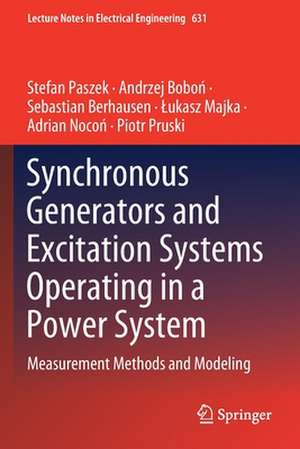Synchronous Generators and Excitation Systems Operating in a Power System: Measurement Methods and Modeling: Lecture Notes in Electrical Engineering, cartea 631
Autor Stefan Paszek, Andrzej Boboń, Sebastian Berhausen, Łukasz Majka, Adrian Nocoń, Piotr Pruskien Limba Engleză Paperback – 4 ian 2021
| Toate formatele și edițiile | Preț | Express |
|---|---|---|
| Paperback (1) | 624.51 lei 3-5 săpt. | +14.15 lei 4-10 zile |
| Springer International Publishing – 4 ian 2021 | 624.51 lei 3-5 săpt. | +14.15 lei 4-10 zile |
| Hardback (1) | 641.20 lei 6-8 săpt. | |
| Springer International Publishing – 4 ian 2020 | 641.20 lei 6-8 săpt. |
Din seria Lecture Notes in Electrical Engineering
- 18%
 Preț: 1859.04 lei
Preț: 1859.04 lei - 18%
 Preț: 895.27 lei
Preț: 895.27 lei - 17%
 Preț: 397.66 lei
Preț: 397.66 lei - 18%
 Preț: 1562.17 lei
Preț: 1562.17 lei - 20%
 Preț: 1473.39 lei
Preț: 1473.39 lei - 18%
 Preț: 5169.60 lei
Preț: 5169.60 lei - 20%
 Preț: 1741.49 lei
Preț: 1741.49 lei - 20%
 Preț: 1918.04 lei
Preț: 1918.04 lei - 18%
 Preț: 1573.20 lei
Preț: 1573.20 lei - 18%
 Preț: 1851.77 lei
Preț: 1851.77 lei - 18%
 Preț: 1578.72 lei
Preț: 1578.72 lei - 18%
 Preț: 1903.08 lei
Preț: 1903.08 lei - 18%
 Preț: 2113.02 lei
Preț: 2113.02 lei - 18%
 Preț: 892.42 lei
Preț: 892.42 lei - 18%
 Preț: 1404.30 lei
Preț: 1404.30 lei - 18%
 Preț: 1133.61 lei
Preț: 1133.61 lei - 18%
 Preț: 1847.84 lei
Preț: 1847.84 lei - 18%
 Preț: 1384.56 lei
Preț: 1384.56 lei - 20%
 Preț: 1300.14 lei
Preț: 1300.14 lei - 20%
 Preț: 1174.76 lei
Preț: 1174.76 lei - 20%
 Preț: 1310.03 lei
Preț: 1310.03 lei - 18%
 Preț: 2546.29 lei
Preț: 2546.29 lei - 20%
 Preț: 1310.03 lei
Preț: 1310.03 lei - 18%
 Preț: 1676.58 lei
Preț: 1676.58 lei - 20%
 Preț: 1182.20 lei
Preț: 1182.20 lei - 18%
 Preț: 1392.46 lei
Preț: 1392.46 lei - 18%
 Preț: 1119.38 lei
Preț: 1119.38 lei - 18%
 Preț: 1678.16 lei
Preț: 1678.16 lei - 18%
 Preț: 1596.85 lei
Preț: 1596.85 lei - 18%
 Preț: 1398.00 lei
Preț: 1398.00 lei - 20%
 Preț: 1445.35 lei
Preț: 1445.35 lei - 18%
 Preț: 1244.89 lei
Preț: 1244.89 lei - 20%
 Preț: 1173.10 lei
Preț: 1173.10 lei - 18%
 Preț: 810.81 lei
Preț: 810.81 lei - 20%
 Preț: 1173.93 lei
Preț: 1173.93 lei - 20%
 Preț: 1482.47 lei
Preț: 1482.47 lei - 20%
 Preț: 1915.57 lei
Preț: 1915.57 lei - 18%
 Preț: 1387.73 lei
Preț: 1387.73 lei - 18%
 Preț: 1425.62 lei
Preț: 1425.62 lei - 20%
 Preț: 1297.67 lei
Preț: 1297.67 lei - 18%
 Preț: 1407.46 lei
Preț: 1407.46 lei - 18%
 Preț: 1667.91 lei
Preț: 1667.91 lei - 18%
 Preț: 1400.35 lei
Preț: 1400.35 lei - 18%
 Preț: 1117.03 lei
Preț: 1117.03 lei - 18%
 Preț: 1573.20 lei
Preț: 1573.20 lei - 18%
 Preț: 1405.90 lei
Preț: 1405.90 lei - 18%
 Preț: 726.37 lei
Preț: 726.37 lei - 18%
 Preț: 1405.90 lei
Preț: 1405.90 lei - 18%
 Preț: 1238.56 lei
Preț: 1238.56 lei - 18%
 Preț: 725.61 lei
Preț: 725.61 lei
Preț: 624.51 lei
Preț vechi: 686.27 lei
-9% Nou
Puncte Express: 937
Preț estimativ în valută:
119.51€ • 129.77$ • 100.39£
119.51€ • 129.77$ • 100.39£
Carte disponibilă
Livrare economică 01-15 aprilie
Livrare express 15-21 martie pentru 24.14 lei
Preluare comenzi: 021 569.72.76
Specificații
ISBN-13: 9783030379780
ISBN-10: 3030379787
Pagini: 160
Ilustrații: XXIII, 160 p.
Dimensiuni: 155 x 235 x 12 mm
Greutate: 0.27 kg
Ediția:1st ed. 2020
Editura: Springer International Publishing
Colecția Springer
Seria Lecture Notes in Electrical Engineering
Locul publicării:Cham, Switzerland
ISBN-10: 3030379787
Pagini: 160
Ilustrații: XXIII, 160 p.
Dimensiuni: 155 x 235 x 12 mm
Greutate: 0.27 kg
Ediția:1st ed. 2020
Editura: Springer International Publishing
Colecția Springer
Seria Lecture Notes in Electrical Engineering
Locul publicării:Cham, Switzerland
Cuprins
Introduction.- Simulation models of generating unit elements.- Analysis of the sensitivity of generating unit simulation waveforms to changes of model parameters.- Method, algorithm and module of a parameter estimation program for mathematical models of synchronous generator and excitation systems.- Forming and filtration of measurement waveforms.- A system for measuring generator load angle.
Textul de pe ultima copertă
In simulation tests of dynamic states of the power system (PS), the database of parameters of mathematical models of generating units is most commonly used. In many cases, the parameter values are burdened with large errors. Consequently, the results obtained are not reliable and do not allow drawing true conclusions. This monograph presents the developed methods and tools supporting the process of measurement determination of reliable values of parameters of mathematical models of synchronous generators and excitation systems. Special measurement tests are the basis for determining the parameters. The tests can be carried out in conditions of normal operation of generating units, in which electrical machines operate in the state of saturation of magnetic cores, and voltage regulators can reach limits. This book is intended for specialists in power engineering as well as students of faculties of electrical engineering interested in issues of PS transient states.
Caracteristici
Presents measurement methods and the most essential results of analyses concerning the parameter estimation of mathematical models of synchronous generators and excitation systems operating in a power system Discusses various mathematical models of the synchronous generators and excitation systems working in the power system in detail Explains the measuring methods developed, the devices constructed, the results obtained and the conclusions drawn, which are used for simulation investigations aiming at the assessment of causes and results of system failures associated with the transient states of a power system, assessment of the system angular stability, optimization of the installation site, and parameters of power system stabilizers, while also assessing the effect of connecting new generating units to the power system
